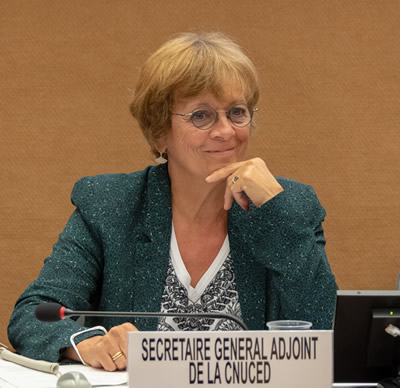Developing countries risk being left out as policymakers grapple with the implications of a digital economy that is already changing the world.
A high-level panel at the sixty-fifth session of UNCTAD’s Trade and Development Board heard that the digital economy is revolutionizing global trade, but it remains unclear exactly how this will transform development outcomes in the world’s poorer countries.
In her opening remarks at the 4 June meeting, UNCTAD Deputy Secretary-General Isabelle Durant said “that the unprecedented expansion of digital technologies is revolutionizing our societies is something that cannot be denied”.
“We know that countries are far from being fully prepared for the digital economy and therefore do not all have the same opportunities to benefit from it,” she said.
Ms. Durant added that UNCTAD was “a pioneer in the work on the development dimension of the digital economy and our expertise is reflected in our solid analytical work, which was discussed and shared during E-Commerce Week”.
She announced that at the request of member States, UNCTAD was organizing a new E-Commerce Week “in Africa and for Africa” later this year.

To boldly go…
On the panel, well-known trade expert Richard Baldwin of the Graduate Institute of Geneva said that in the past, when people thought about trade and development they had trade in manufactured goods in mind, but the world has moved on.
Beer was good in Germany and wine was good in France, he said by way of illustration, and globalization was driven by companies exploiting this. It was easier to move goods rather than services across borders, Mr. Baldwin explained.
“But why? What is it about services that prevents their movement across borders?” he asked. The buyer and seller traditionally had to be in the same place but today the digital world was changing this, he said.
Domestic telecommuting was established in developed economies and very developed in some sectors, Mr. Baldwin said, but this will accelerate globally.
“Platforms for services like Upwork are growing rapidly,” he said, referring to a freelancing work exchange that works like eBay but for services. Machine translation was revolutionizing this market.
“The universal translator of Star Trek when I was learning French in High School is now a reality,” Mr. Baldwin said, adding that the “tsunami” of opportunity this will unleash was certain to revolutionize the world of work and change the nature of globalization in just a few years.
What this meant for developing countries remained unclear, he said. But services exports are certain to play a central role and digital technology was the “container ship” of services exports – it would revolutionize services trade in the same way containers had for trade in goods.
Positive opportunities
Vincent Champain of GE Digital Foundry Europe, said the unimaginable advances of technology since man was put on the moon meant that the world had changed, and productivity was expanding.
Artificial Intelligence (AI) would help, for example, spread medical diagnostics to more people, Mr. Champain said, although doctors combined with AI (so-called “centaur” technology) promised the most immediate application.
Turning to developing countries, Mr. Champain said that leapfrogging meant that they need not necessarily lose out – “think of Kenya and its leading role in mobile money”.
Mr. Champain said that policymakers in developing countries should not be distracted by risks and focus on the positive opportunities offered by the changing landscape.
Speaking on behalf of the West African Economic and Monetary Union, Ambassador Iba Mar Oulare said that e-commerce was just starting up in his region, so West African countries were at the stage of grappling with the policy implications.
“Africa currently trades mostly raw materials with little value added and it is now urgent that its leaders fully comprehend how technology will change this trade and all trade on the continent,” Mr. Mar Oulare said.
With little data on which to base policymaking, Mr. Mar Oulare said, his group welcomed the actions undertaken by the African Union and UNCTAD to deepen knowledge of implications of the digital economy in his region.
“E-trade is no doubt occurring in Africa, but national and regional legislation is out of date,” Mr. Mar Oulare said. “My group welcomes the initiative taken by UNCTAD to organize an e-commerce event for Africa.”



